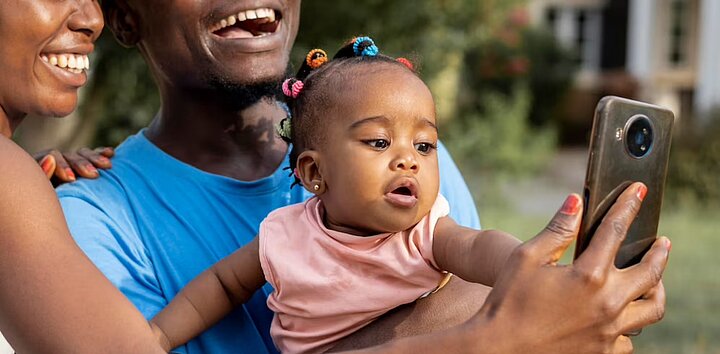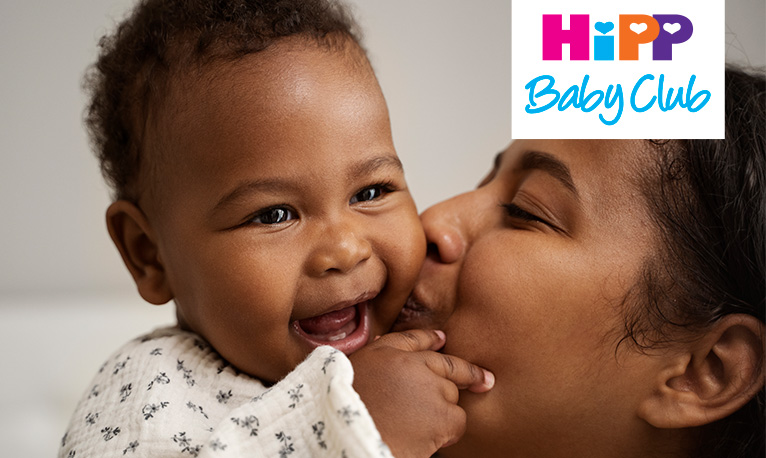Parenting in a digital age
Newborn | | HiPP Organic
Welcome to the digital age, where parenting has taken on a whole new meaning. From Instagram mum-fluencers to TikTok dads, social media has given rise to a plethora of online parenting figures who are redefining what it means to be a parent in the 21st century. But how do influencers really compare to real-life parents? In this blog post, we'll explore the differences between traditional parents and their digital counterparts, and touch on keeping your child safe in the digital world.
The digital age: how parents compare to mum-fluencers and other online parenting figures
The digital age has resulted in a massive shift in the way parents consume information and advice. The rise of social media has meant that parents are now able to connect with other parents online, and receive (and share) advice and support like never before.
However, the vast quantity of parenting information available online can be seriously overwhelming, and it can be difficult to know who to trust. This is where mum-fluencers come in - women who use social media to share their parenting experiences and provide advice and support to other parents.
There are advantages to following mum-fluencers on social media. Firstly, they provide a real and relatable voice in the midst of all the noise on the internet. Secondly, they offer valuable insights into the day-to-day reality of parenting – something that can be hard to find elsewhere online. And thirdly, they can be a great source of support for other parents who might be feeling isolated or alone in their parenting journey. Of course there are also disadvantages, which we’ll touch on below.
Typical online parenting figures and how they differ from traditional parents
The internet has given rise to the online parent. These are parents who share their lives and parenting journeys online, usually through social media platforms such as Instagram, YouTube and Facebook.
While there are many positives to this new way of sharing parenting advice and stories, there are also some potential downsides. Here, we take a look at some of the typical online parenting figures and how they differ from traditional parents.
- Mum-fluencers - Mum-fluencers often use their platform to promote products or brands, and may receive freebies or sponsored posts in return. While they can be a great source of inspiration and advice for other parents, it's important to remember that they're also often running a business. As such, their content is likely to be carefully curated and may not always be entirely truthful.
- Parenting bloggers - Parenting bloggers are another popular type of online parent. They tend to write longer pieces on their website or blog about their experiences raising kids. Some bloggers focus on specific topics such as sleep training or fussy eating, while others simply document their day-to-day journey as parents. Like mum-fluencers, they may also receive freebies or sponsored posts in return for promoting products on their site.
Benefits of connecting with other online parenting figures
It can be difficult for parents to feel like they are doing a good job. Parenting is relentless and overwhelming at times. With all of the advice out there, it's hard to know what is best for your child. It can be helpful to connect with other online parenting figures for support and advice.
Some benefits of connecting with other online parenting figures include:
- Feeling supported and not alone in your parenting journey
- Receiving advice and tips from other experienced parents
- Having a community of parents to turn to when you need help or advice
- Gaining different perspectives on parenting topics - especially in the comment section of others posts
How to protect your child's privacy when posting on social media
In the digital age, it is important for parents to be aware of how to protect their child's privacy when posting on social media. Here are some tips:
- Use privacy settings: Make sure your privacy settings are set to only allow friends and family to see your posts - unless you're aiming to become an influencer of course. This will help to ensure that strangers cannot access your photos and information.
- Be mindful of what you share: Be careful about what photos and information you share online. Remember that once something is posted, it can be difficult to control who sees it and how it is used, as a screen shot can be taken and is then easily redistributed.
- Teach your children about online safety: Talk to your children about the importance of keeping their personal information private. Help them to understand how to use privacy settings on social media platforms and encourage them to be thoughtful about what they share online, background information and information belonging to others.
Tips for parents in the digital age
In the digital age, parenting can feel like a minefield. With social media platforms providing a never-ending scroll of #mumlife and #dadlife content, it’s easy to compare ourselves to the online parenting figures we follow and feel like we’re falling short.
But there are some things that all parents can do to navigate the digital age with a bit more confidence. Here are some tips:
- Be thoughtful about the advice you take from online sources. Just because something is popular doesn’t make it right for you and your family. Consider your own values and what will work for you before taking advice from anyone – even your favourite mum-fluencer.
- Use social media as a positive force in your life, rather than letting it make you feel inadequate. Follow accounts that make you feel good about yourself and your parenting choices, and unfollow any that don’t.
- Don’t be afraid to ask for help when you need it. There are plenty of experts out there who can offer impartial, evidence-based advice when you need it – whether that’s your GP, a qualified counsellor or psychologist, or health visitor. Sometimes face-to-face help is the best kind of help there is.
In the digital age, parenting has changed significantly due to the rise of mum-fluencers and other online parenting figures. While many parents may feel overwhelmed by how these online influencers appear to have all the answers, it is important to remember that they are still only human. Many people only share the best bits and snippets of their filtered lives.
Parenting will always remain a unique experience for each family, as every situation and child is different. Despite this new wave of digital parenting guidance, real life experiences will always be invaluable when raising children in an everchanging world.


